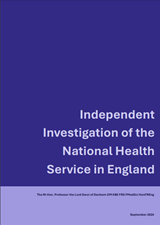Independent Investigation of the National Health Service in England

Commissioned by the incoming Labour Government when it came into office in July, this is the publication of the results of Lord Darzi’s rapid review on the state of the NHS in England.
It draws attention to a number of significant challenges that have left the NHS in a critical condition, including:
- the impact of the pandemic and a decade of austerity predating Covid-19;
- subsequent workforce pressures;
- increasing demand on services due to the deterioration of the nation’s health and rising health inequalities;
- tens of £ billions underinvestment in new health infrastructure and maintenance of existing NHS estate; and
- the result of the system reform brought about by the Health and Care Act 2012.
However, with an ambition of “care closer to home”, the Darzi review notes that NHS reforms and spending on acute services has risen at the expense of community and primary care services, and also seen reductions in public health funding. And, while adult social care and housing were outside the remit of the investigation, it reports that 13% of NHS beds are occupied by people requiring social support or care in more appropriate settings.
The review makes a number of important proposals with a focus on tackling health inequity, mental health, public health, prevention, system leadership, integrated care and partnership working (vertically and horizontally) to deliver better person-centred outcomes and place-based health improvements. But it also points out that the NHS is in the “foothills” in the use of technology and must move towards a “predict and prevent” approach rather than “diagnose and treat”.
On housing specifically, it recognises how homelessness, poor quality housing and housing conditions can all create poor health. It sees these as part of a new call to tackle the wider determinants of health and how the government should develop a twin-track plan to improve the health of the nation and rebuild the NHS.
